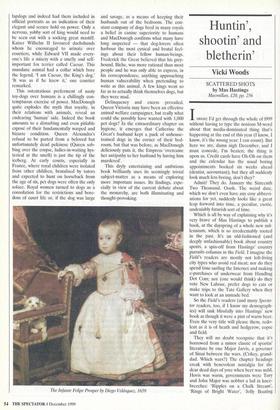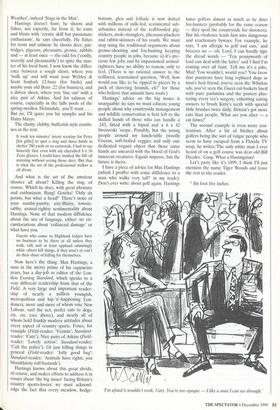Huntin', shootin' and bletherin'
Vicki Woods
SCATTERED SHOTS by Max Hastings Macmillan, £20, pp. 256
Iswore I'd get through the whole of 1999 without having to type the noxious M-word about that media-dominated thing that's happening at the end of this year (I know, I know, it's the wrong year; I can count). But here we are, damn nigh December, and I must concede, I'm beaten; the thing is upon us. Credit cards have Oh-Oh on them and the calendar has the usual boring appointments booked six weeks ahead (dentist, accountant), but they all suddenly look much less boring, don't they?
Admit! They do. January the Sixteenth Two Thousand. Oooh. The weird date, which we don't even have any cosy abbrevi- ations for yet, suddenly looks like a great leap forward into time, a peculiar, exotic, undeniably futurish sort of time.
Which is all by way of explaining why it's very brave of Max Hastings to publish a book, at the dayspring of a whole new mil- lennium, which is so irredeemably rooted in the past. It's an old-fashioned (and deeply unfashionable) book about country sports, a spin-off from Hastings' country pursuits columns in the Field. I imagine the Field's readers are mostly not loft-living city types who avoid red meat; nor do they spend time surfing the Internet and making e-purchases of underwear from Handbag Dot Com; nor (one would think) do they vote New Labour, prefer dogs to cats or make trips to the Tate Gallery when they want to look at an unmade bed.
So the Field's readers (and many Specta- tor readers, too, if I know my demograph- ics) will sink blissfully into Hastings' new book as though it were a pint of warm beer. Even the very title will please them, redo- lent as it is of heath and hedgerow, copse and field.
They will no doubt recognise that it's borrowed from a minor classic of sportin' literature by one Major Jarvis, a govemer of Sinai between the wars. (Crikey, grand- dad. Which wars?) The chapter headings creak with benevolent nostalgia for the dear dead days of yore when beer was mild, Hovis was warm, governments were Tory and John Major was nobbut a lad in knee- breeches: 'Ripples on a Chalk Stream', `Rings of Bright Water', 'Jolly Boating Weather', indeed 'Stags in the Mist'.
Hastings doesn't hunt; he shoots and fishes, not expertly, far from it; he casts and blasts with 'erratic skill but passionate enthusiasm', he says cheerfully. He fishes for trout and salmon; he shoots deer, par- tridges, pigeons, pheasants, grouse, rabbits and — at least once — the odd fox ('coolly, secretly and pleasurably') to spite the mas- ter of his local hunt. I now know the differ- ence between a rough shoot, where you 'walk up' and will want your Webley & Scott boxlock 12-bore (for birds) and maybe your old Brno .22 (for bunnies), and a driven shoot, where you 'line out' with a nice pair of Atkins. And for salmon, of course, especially in the falls pools of the spring-swollen Helmsdale, you'll want . . . But no. I'll spare you his nymphs and his Hairy Marys.
The chatty, clubby, bufferish style contin- ues in the text:
It took ten minutes' intent scrutiny for Peter [his gilliel to spot a stag and three hinds in shelter 700 yards or so eastwards. I had to say honestly that even with my cherished 8 x 56 Zeiss glasses, I could have studied the hill all morning without seeing those deer. But that is what the art of the professional stalker is all about.
And what is the art of the amateur shooter all about? Killing the stag, of course. Which he does, with great pleasure and enthusiasm. Bang! Gotcha! 'Only six points, but what a head!' There's none of your namby-pamby, airy-Blairy, townie- sabby, animal-rightsy sentimentality about Hastings. None of that modern diffidence about the use of language, either: no cir- cumlocutions about 'collateral damage' or what have you.
Guests who come to Highland lodges have no business to be there at all unless they walk, talk and at least applaud admiringly while others kill things, if they won't or can't do their share of killing for themselves.
Now here's the thing: Max Hastings, a man in the merry prime of his cappucino years, has a day-job as editor of the Lon- don Evening Standard, which speaks to a very different readership from that of the Field. A very large and important reader- ship of nearly a million youngish, metropolitan and hip-'n'-happening Lon- doners, more and more of whom vote New Labour, surf the net, prefer cats to dogs, etc. etc. (see above), and nearly all of whom hold frankly modern attitudes about every aspect of country sports. Foxes, for example (Field-reader: 'Vermin'; Standard- reader: 'Cute'). Nice pairs of Atkins (Field- reader: 'Lovely action; Standard-reader: `Call the police'). Or just killing things in general (Field-reader: 'Jolly good bag'; Standard-reader: 'Animals have rights, you bloodthirsty toff bastards').
Hastings knows about this great divide, of course, and makes efforts to address it in essays about 'the big issues' facing Britain's country sports-lovers: we must acknowl- edge the fact that every meadow, hedge-
bottom, glen and fellside is now dotted with millions of milk-fed, sentimental sub- urbanites instead of the redblooded pig- stickers, mole-stranglers, pheasant-pluckers and rabbit-skinners of his youth. We must stop using the traditional arguments about grouse-shooting and fox-hunting keeping country people in jobs, because a) it's pre- cious few jobs and b) impassioned animal- rightsers have no ability to reason, only to feel. (There is no rational answer to the redfaced, tearstained question, 'Well, how would you like to be ripped to pieces by a pack of slavering hounds, eh?' for those who believe that animals have souls.) Hastings' advice on the big issues is unarguable: he says we must educate young people about why countryside management and wildlife conservation is best left to the skilled hands of those who can handle a .243, fitted with a bipod and a 6 x 42 Swerovski 'scope. Possibly, but the young people around my lunch-table (woolly Greens, soft-boiled veggies and only one dedicated vegan) object that those same hands are smeared with the blood of God's innocent creatures. Equals impasse, but the future is theirs.
I have a piece of advice for Max Hastings (which I proffer with some diffidence to a man who walks very tall* in my trade). Don't ever write about golf again. Hastings hates golfers almost as much as he does fox-hunters (probably for the same reason — they spoil the countryside for shooters). But his virulence leads him into dangerous and reactionary byways. For example, he says, 'I am allergic to golf and cats,' and breezes on — oh, Lord, I can hardly type the dread words — 'Ten pennyworth of lead can deal with the latter' and I find I'm coming over all faint. Tell me it's a joke, Max! You wouldn't, would you? You know that pussycats have long replaced dogs as man's best friend, you've seen the Whiskas ads, you've seen the Gucci cat-baskets lined with pure pashmina and the posters plas- tering every vet's surgery, exhorting caring owners to brush Kitty's teeth with special little brushes twice daily. Britain's got more cats than people. What are you after — a cat fatwa?
The second example is even more con- tentious. After a bit of blether about golfers being the sort of vulgar people who seem to have escaped from a Florida TV soap, he writes,`The only white man I ever heard of on a golf course was dear old Bill Deedes.' Gasp. What a Hastingsism!
Let's party like it's 1899. I think I'll just mention the name Tiger Woods and leave the rest to the reader.
* Six foot five inches 'I'm afraid it wouldn't work, Gary. You're too opaque — I like a man I can see through.'



















































































 Previous page
Previous page